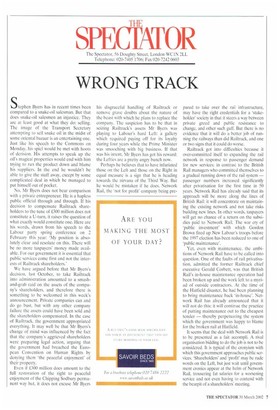WRONG TRACK
Stephen Byers has in recent times been compared to a snake-oil salesman, But that does snake-oil salesmen an injustice. They are at least good at what they do: selling. The image of the Transport Secretary attempting to sell snake oil in the midst of some oriental bazaar is an entertaining one. Just like his speech to the Commons on Monday, his spiel would be met with hoots of derision. His attempts to speak up the oil's magical properties would end with him trying to run the product down and blame his suppliers. In the end he wouldn't be able to give the stuff away, except by some complicated deal in which he managed to put himself out of pocket.
No, Mr Byers does not bear comparison with a private entrepreneur. He is a hapless public official through and through. If his decision to compensate Railtrack shareholders to the tune of .E300 million does not constitute a U-turn, it raises the question of what exactly would constitute one. Here are his words, drawn from his speech to the Labour party spring conference on 2 February this year: 'My position is absolutely: clear and resolute on this. There will be no more taxpayers' money made available. For our government it is essential that public services come first and not the interests of Railtrack shareholders.'
We have argued before that Mr Byers's decision. last October, to take Railtrack into administration amounted to a smashand-grab raid on the assets of the company's shareholders, and therefore there is something to be welcomed in this week's announcement. Private companies can and do go bust, but with any other company failure the assets could have been sold and the shareholders compensated. In the case of Railtrack, the government appropriated everything. It may well be that Mr Byers's change of mind was influenced by the fact that the company's aggrieved shareholders were preparing legal action, arguing that the government had breached the European Convention on Human Rights by denying them 'the peaceful enjoyment' of their property.
Even if £300 million does amount to the full restoration of the right to peaceful enjoyment of the Chipping Sodbury permanent way hut, it does not excuse Mr Byers his disgraceful handling of Railtrack or remove grave doubts about the nature of the beast with which he plans to replace the company. The suspicion has to be that in seizing Rai'track's assets Mr Byers was playing to Labour's hard Left: a gallery which required paying off for its loyalty during four years while the Prime Minister was smooching with big business, If that was his intent, Mr Byers has got his reward: the Lefties are a pretty angry bunch now.
Perhaps he believes that to have infuriated those on the Left and those on the Right in equal measure is a sign that he is heading towards the nirvana of the Third Way. But he would be mistaken if he does. Network Rail, the 'not for profit' company being pre pared to take over the rail infrastructure, may have the right credentials for a 'stakeholder' society in that it steers a way between private greed and public resistance to change, and other such guff. But there is no evidence that it will do a better job of running the railways than did Railtrack, and one or two signs that it could do worse.
Railtrack got into difficulties because it over-committed itself to expanding the rail network in response to passenger demand for new services; in contrast to the British Rail managers who committed themselves to a gradual running down of the rail system — passenger numbers increased significantly after privatisation for the first time in 50 years. Network Rail has already said that its approach will be more along the lines of British Rail: it will concentrate on maintaining the existing network and not take risks building new lines. In other words, taxpayers will get no chance of a return on the subsidies paid to Network Rail. The war cry of 'public investment' with which Gordon Brown fired up New Labour's troops before the 1997 election has been reduced to one of 'public maintenance', Yet, even with maintenance, the ambitions of Network Rail have to be called into question. One of the faults of rail privatisation, admitted the former Railtrack chief executive Gerald Corbett, was that British Rail's in-house maintenance operation had been broken up and the work left to a myriad of outside contractors. At the time of the Hatfield disaster, he had been planning to bring maintenance back 'in-house'. Network Rail has already announced that it will not do this: it will continue the practice of putting maintenance out to the cheapest tender — thereby perpetuating the system which the government was happy to blame for the broken rail at Hatfield.
It seems that the deal with Network Rail is to be presented as a fait accompli. A rival organisation bidding to do the job is not to be considered. It is typical of the cronyism with which this government approaches public services. 'Shareholders' and 'profit' may be rude words on the Left, but just wait until government cronies appear at the helm of Network Rail, trousering fat salaries for a worsening service and not even having to contend with the bearpit of a shareholders' meeting.


































































 Previous page
Previous page